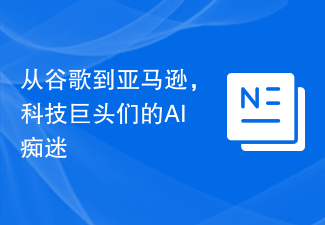
In an interview with VentureBeat on Monday, Swami Sivasubramanian, Amazon’s Vice President of Data and Artificial Intelligence at AWS, said that he oversees all AWS databases, analytics, Machine learning and artificial intelligence services, and briefly outlined Wednesday morning's keynote address and Tuesday morning's keynote address from AWS CEO Adam Selipsky
The main theme around GenAI is that enterprise There is a desire to have the flexibility and choice to use different models from different suppliers rather than being locked into a single supplier or platform, however, he added that the models themselves may not be enough to provide a competitive advantage as time goes on. , they are likely to become commoditized, so a key advantage for businesses will be their own proprietary data and how they integrate that data with models to create unique applications.
To support this vision, Sivasubramanya said Amazon is focused on emphasizing two aspects: first, invention, providing various GenAI models that customers can access through its basic services, and more Good, seamless data management tools for customers to use to build and deploy their own GenAI applications How to not only benefit from data, but in turn enhance and improve databases and data systems
Siva Subramanian revealed some highlights at Re:Inventent. Just two weeks ago, Microsoft showed off their plans to go all-in on GenAI at rival Ignite conference. In less than a minute: AWS's Bedock, launched in April, is a completely A managed service that allows customers to use underlying GenAI models provided via API. Sivasubramanya said bedrock is becoming easier to work with. He will feature some customer stories showing how easy and fast it is to build applications on Bedrock, with some examples taking less than a minute. He said customers such as Booking.com, Intuit, LexusNexis and Bridgewater Associates are among the companies using Bedock to create impactful applications.
BedRock has given enterprise customers more LLM options, including companies like Its own pre-trained foundation model Titan, as well as foundation models from third parties such as AI21’s S Jurassic, Anthropic’s Claude, Meta’s Llama 2 and Stable Diffusion. Expect to see more action in the future, including more about Amazon's partnership with OpenAI rival Anthropic, following a major investment in the company in September. "We will continue to invest heavily in vehicle selection," Sivasubramanian said.
Vector database expansion: Another area where GenAI models can help is vector databases, which support cross-image, Semantic search of unstructured data such as text and video. By using GenAI models, Vector Database can find the most relevant and similar data to a given query, rather than relying on keywords or metadata. In July of this year, Amazon launched a vector database feature-Vector Engine for its OpenSearch Serverless in preview mode. Sivasubramanya said the vector engine has gained impressive traction since its launch and hinted that it may soon become ubiquitous. He also hinted that Amazon might expand vector search capabilities to other databases in its portfolio. "You're going to see that as part of Bedrock we're going to make this easier and better, but also in a lot of other areas," he said.
In terms of Gen AI applications, Sivasubramanian hinted at some announcements related to the application layer of the enterprise GenAI stack. He mentioned some examples of applications that are already available and integrated with GenAI models, such as Amazon QuickSite. It is a serverless tool that allows customers to create and share interactive dashboards and reports. Additionally, there is Amazon HealthScribe, which automatically generates clinical notes by analyzing patient conversations with clinicians. These applications are designed to be convenient for users who may not have any GenAI or coding knowledge or experience
For enterprises with complex data needs, integrating data from disparate sources and formats is a key challenge. Traditional extract, transform, and load (ETL) processes are cumbersome and expensive, requiring moving data from one database to another, as well as performing data transformations and transformations. To avoid this friction, some cloud providers are developing "fabric" technologies that use open and standard formats for data exchange and interoperability. Microsoft has been touting its Fabric plans, but some analysts say Amazon has an advantage over Microsoft and Google with zero ETL. Sivasubramanya said Amazon has been trying to give developers a choice of databases and will continue to invest in its zero-ETL vision, which it began last year with the integration of some of its own databases, such as Aurora and RedShift. Enterprises want to store and query their vector data and other business data in their databases. Sivasubramanya said Amazon will continue to improve these services, while mentioning that Amazon's Aurora MySQL recently added support for vector searches. It is reported that Aurora MySQL is a cloud-based relational database. Amazon will make greater and more meaningful progress toward zero ETL in the future
During Selipsky and Sivasubramanya’s keynote, several AWS customers shared their Stories about how GenAI-based models can be customized through further training or fine-tuning to meet their specific needs and domains. However, they do so without compromising the security and privacy of the data, as the data remains stored in the customer's own virtual private cloud (VPC), a secure and isolated part of the AWS cloud. Sivasubramanya said that this is one of the important differences between AWS and other cloud service providers. At the same time, to ensure customer data security, AWS provides secure GenAI customization services
GenAI chip innovation: Finally, Amazon has been developing its own silicon solutions to support GenAI. Sivasubramanya said AWS will provide some new updates on the performance and adoption of its Nitro Hypervisor and Graviton series of chips, which are designed to deliver high performance and low cost for cloud computing. He will also introduce the company's Tradium and Inferania chips, which are designed for GenAI training and inference respectively
The above is the detailed content of Amazon AWS and Microsoft will compete in GenAI field. For more information, please follow other related articles on the PHP Chinese website!
 从谷歌到亚马逊,科技巨头们的AI痴迷Jun 12, 2023 pm 05:51 PM
从谷歌到亚马逊,科技巨头们的AI痴迷Jun 12, 2023 pm 05:51 PM最近,国外几家久负盛名的科技巨头展示了他们的AI雄心。例如苹果举办WWDC23,微软召开Build23,就连谷歌也在2月份举办了搜索业务大会。这些巨头们的动作,无疑彰显了生成式人工智能(AIGC)的崛起,也带动了一批此前对人工智能不感兴趣的团队、机构。现在这些大型科技公司全力押注人工智能,值得注意的几个标志是:GoogleAI、MicrosoftCopilot、Apple机器学习以及OpenAI追求通用人工智能。苹果的机器学习苹果公司似乎对人工智能这个词“不感冒”。在今年的WWDC上,只字未提“
 亚马逊AWS与微软将在GenAI领域展开竞争Nov 29, 2023 pm 08:15 PM
亚马逊AWS与微软将在GenAI领域展开竞争Nov 29, 2023 pm 08:15 PM周一接受VentureBeat采访时,亚马逊AWS数据与人工智能副总裁斯瓦米·西瓦苏布拉曼尼亚表示,他负责监管AWS所有的数据库、分析、机器学习和人工智能服务,并简述了周三上午的主旨演讲和周二上午AWS首席执行官亚当·塞利普斯基的主旨演讲他说,围绕GenAI的主要主题是,企业希望有灵活性和选择来使用来自不同供应商的不同模型,而不是被锁定在单一供应商或平台上,然而,他补充说,这些车型本身可能不足以提供竞争优势,因为随着时间的推移,它们可能会变得商品化,因此,企业的关键优势将是他们自己的专有数据,以
 前百度副总裁储瑞松接任亚马逊云科技大中华区负责人Oct 09, 2023 pm 04:57 PM
前百度副总裁储瑞松接任亚马逊云科技大中华区负责人Oct 09, 2023 pm 04:57 PM本站10月9日消息,亚马逊云科技全球销售、市场和服务高级副总裁MattGarman对内宣布了大中华区领导人变更,储瑞松将接任张文翊担任亚马逊全球副总裁、亚马逊云科技大中华区执行董事,张文翊将会有新的职务任命。储瑞松公开资料显示,加入亚马逊云科技之前,储瑞松担任百度集团副总裁接近四年之久,是百度高层管理团队之一,负责领导百度阿波罗智能汽车业务,于今年7月份离职。在此之前,他的大部分职业生涯都在SAP度过,担任过工程、战略、业务开发等多个领导职位,并最终负责S/4HANA云产品全球研发,领导遍布德国
 顺丰面向亚马逊推出旺季“晚到必赔”服务,单票最高赔偿 300 元Nov 21, 2023 pm 09:33 PM
顺丰面向亚马逊推出旺季“晚到必赔”服务,单票最高赔偿 300 元Nov 21, 2023 pm 09:33 PM本站11月21日消息,顺丰推出旺季“晚到必赔”增值服务,主要面向使用亚马逊线上“购买配送”服务的卖家,11月15日-12月31日活动期间使用顺丰国际电商专递-优先CD或国际电商专递-CD产品,由中国发至美国流向即可享受9折运费优惠,并承诺分别于10个工作日和13个工作日内送达,晚到必赔,按比例赔付运费,单票最高赔偿金额为300元人民币。我们注意到,快递的揽收城市包括深圳、佛山、广州、东莞、厦门、福州、泉州、杭州、上海、苏州、合肥、莆田、新乡、南京、南昌国际电商专递-CD(E-CommerceEx
 亚马逊宣布Mac经典版Kindle应用停止支持,新版即将登场Sep 07, 2023 am 10:29 AM
亚马逊宣布Mac经典版Kindle应用停止支持,新版即将登场Sep 07, 2023 am 10:29 AM9月6日消息,亚马逊近日宣布了一项重要的决定,将在今年10月停止支持其在苹果macOS平台上的Kindle应用,并计划推出一款全新的Kindle应用程序。这一决策引起了广泛关注,因为它标志着亚马逊将迈向一个全新的阅读应用时代。亚马逊的原始Kindle应用已经在苹果macOS平台上存在了整整8年,为Mac用户提供了便捷的电子书阅读体验。然而,随着技术的不断发展,亚马逊决定升级他们的阅读应用,以适应现代需求。根据亚马逊的官方消息,新的Kindle应用将基于ReactNative开发,这将为用户带来更
 亚马逊打不开的原因是什么Nov 02, 2023 pm 06:01 PM
亚马逊打不开的原因是什么Nov 02, 2023 pm 06:01 PM亚马逊打不开的原因有网络连接问题、DNS解析问题、防火墙或代理问题、浏览器问题、地理位置限制、亚马逊服务器问题等。其解决办法:1、检查您的网络连接是否正常,确认您的设备已连接到互联网;2、可以尝试刷新DNS缓存或更改使用其他DNS服务器来解决此问题;3、尝试禁用防火墙或代理,或者调整其设置以允许访问亚马逊;4、尝试清除浏览器缓存、禁用插件或尝试使用其他浏览器来访问亚马逊等等。
 亚马逊第二季度营收 1344 亿美元增长 11%,同比扭亏为盈Aug 15, 2023 pm 02:25 PM
亚马逊第二季度营收 1344 亿美元增长 11%,同比扭亏为盈Aug 15, 2023 pm 02:25 PM北京时间8月4日早间消息,亚马逊今日发布了截至6月底的2023年第二季度财报。报告显示,亚马逊第二季度净销售额为1344亿美元(当前约9649.92亿元人民币),与上年同期的1212亿美元相比增长11%。净利润为67.50亿美元(当前约484.65亿元人民币),而上年同期净亏损20.28亿美元。相比之下,37位分析师平均预计,亚马逊第二季度营收将达到1315亿美元。财报显示,亚马逊第二季度营收为1344亿美元,高于分析师预期。36位分析师平均预计,亚马逊第二季度每股摊薄收益将达到0.35美元。财
 亚马逊是什么电商平台Jan 25, 2021 am 10:52 AM
亚马逊是什么电商平台Jan 25, 2021 am 10:52 AM亚马逊是一家网络电商平台,该公司位于华盛顿州的西雅图,是网络上最早开始经营电子商务的公司之一;亚马逊是贝佐斯在1995年创立的,亚马逊平台主要营收是通过收取15%的交易佣金,亚马逊在平台上制定各种规则与制度都是为了提高交易量。


Hot AI Tools

Undresser.AI Undress
AI-powered app for creating realistic nude photos

AI Clothes Remover
Online AI tool for removing clothes from photos.

Undress AI Tool
Undress images for free

Clothoff.io
AI clothes remover

AI Hentai Generator
Generate AI Hentai for free.

Hot Article

Hot Tools

SublimeText3 Chinese version
Chinese version, very easy to use

mPDF
mPDF is a PHP library that can generate PDF files from UTF-8 encoded HTML. The original author, Ian Back, wrote mPDF to output PDF files "on the fly" from his website and handle different languages. It is slower than original scripts like HTML2FPDF and produces larger files when using Unicode fonts, but supports CSS styles etc. and has a lot of enhancements. Supports almost all languages, including RTL (Arabic and Hebrew) and CJK (Chinese, Japanese and Korean). Supports nested block-level elements (such as P, DIV),

SublimeText3 Linux new version
SublimeText3 Linux latest version

MantisBT
Mantis is an easy-to-deploy web-based defect tracking tool designed to aid in product defect tracking. It requires PHP, MySQL and a web server. Check out our demo and hosting services.

SAP NetWeaver Server Adapter for Eclipse
Integrate Eclipse with SAP NetWeaver application server.






